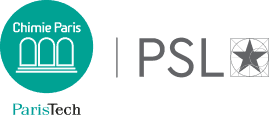Chimie ParisTech’s influence is based on an extremely dynamic research cluster that conducts a multidisciplinary research activity at the best academic level on a national and international level.
The school’s research structure offers innovative and integrated research that is comprehensive and ranges from fundamentals to applications, covering the major areas of current chemistry (energy, resources, health, etc.). This research is done with a strong interaction with the industrial world, which allows it to register its research work in a partnership model of valorization in the long term. The goal of these partnerships is also to initiate technology transfers. This is therefore a strong foundation for the development of the school’s innovation policy.
Academic and/or research chairs
These partnerships, which are directly linked to strong socio-economic challenges, are generally based on co-financing models shared by companies and public institutions.
These models rely on partnership systems such as academic and/or research chairs to establish a lasting cooperation.
These systems are put in place to develop scientific research and the engineering profession in the face of new societal challenges. The idea is to share complementary approaches around innovative research themes. Chimie ParisTech is involved in two chairs:
The “Nuclear engineering” ParisTech chair
The ParisTech “Urban Mines” and Eco-system chair
Labcoms
Chimie ParisTech offers other partnership tools, such as the Joint Research Labs (Labcom). By having research teams collaborate with companies, they can reinforce a specific expertise by relying on the complementarity of their approaches.
They present several advantages. On the one hand, academic teams have the opportunity to put their research work into a long-term valuation model; on the other hand, companies can rely on additional resources, especially concerning upstream research for the development of their innovation policy.
These labcoms lead to a number of technology transfers to the development of innovative products in key markets.
CIFRE Thesis
The CIFRE program (“Conventions industrielles de formation par la recherche” for Industrial Research Training Agreements) subsidizes any French company that hires a PhD student and involves them in a research collaboration with a public laboratory. Their work culminates in the defense of a thesis in three years.
CIFRE agreements are financed by the Ministry of Higher Education for Research and Innovation, which entrusted their implementation to the ANRT. The ANRT pays the company an annual subsidy for 3 years when they hire PhD students doing their thesis under a 36-month open-ended or fixed-term employment contract. The remaining costs borne by the company for their salary may be eligible for the Research Tax Credit (“CIR” in France).
Nearly 25% of the about one hundred theses in progress at Chimie ParisTech are financed by companies and manufacturers.
To learn more about PhD studies
To learn more about the CIFRE program
Patent applications
Teacher researchers regularly file patents as part of their research via the CNRS, PSL or joint research laboratories or research chairs.
Here are some examples:
- For the Biotech Dental labcom: F. Prima and S. Delannoy; “Ternary Ti-Zr-O alloys, methods for producing same and associated utilizations thereof”; Patent EP 17202971 (2017).
- For the Urban Mines chair: F. Rousseau, O. Lesage, J. Cramer, F. Prima, D. Morvan; “Extraction and selective recovery method of elements contained in natural or urban ores by multi-phase electrochemistry at high temperature assisted by power plasma”; Patent PCT/FR2016/372412 (2016)

